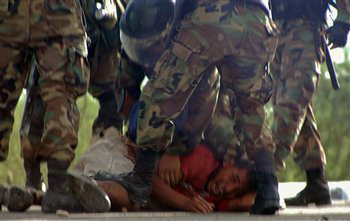
|  |  |  Americas & Beyond | June 2009 Americas & Beyond | June 2009  
9 More Police Killed in Amazon Protests in Peru
 Franklin Briceno - Associated Press Franklin Briceno - Associated Press
go to original


| | In this picture released by Amazon Watch on June 6, 2009, an Indian protester screams as he is subdued by police in Bagua Grande in Peru's northern province of Utcubamba, Friday, June 5, 2009. (AP/Amazon Watch) |  |
Bagua, Peru — President Alan Garcia labored Saturday to contain Peru's worst political violence in years, as nine more police officers were killed in a bloody standoff with Amazon Indians fighting his efforts to exploit oil, gas and other resources on their native lands.

The new deaths brought to 22 the number of police killed – seven with spears – since security forces moved early Friday to break up a roadblock manned by 5,000 protesters.

Protest leaders said at least 30 Indians, including three children, died in the clashes. Authorities said they could confirm only nine civilian deaths, but cabinet chief Yehude Simon told reporters that 155 people had been injured, about a third of them with bullet wounds.

He announced a 3 p.m.-6 a.m. curfew, which took effect immediately in this sweltering jungle region where Simon said authorities had made 72 arrests.

In a statement issued Saturday, Garcia defended the crackdown as an attack on "subversive anti-democratic aggression" that had blocked the flow of oil and gas from the Amazon and prevented food, medicine and gasoline from getting in.

The political violence is the Andean country's worst since the Shining Path insurgency was quelled more than a decade ago and bodes ill for Garcia's ambitious plans to boost Peru's oil, gas and mineral output and spur logging and biofuel development. Garcia compared the "savage and barbaric methods" used to kill police "who had surrendered and been disarmed" with those employed by the Shining Path.

The violence began before dawn Friday when security forces moved to break up a roadblock protesters mounted in early April. About 1,000 protesters seized police during the melee, taking more than three dozen hostage, officials said.

Twenty-five officers were rescued in Saturday's storming of Station No. 6 at state-owned Petroperu in Imacita here in the jungle state of Amazonas, authorities said, with two officers missing.

Simon said the nine killed were taken more than a mile from the station and slain while an army general was negotiating protesters' retreat from the facility.

Among at least 45 people being treated at the main hospital in the Amazonas town of Bagua was local Indian leader Santiago Manuin, who received eight bullet wounds on Friday, said a nurse who identified herself only as "Sandra" for security reasons.

Peru's public ombudsman, Beatriz Merino, toured hospitals and clinics in the violence-wracked Utcubamba province, of which Bagua is the seat, and complained of a shortage of "blood, analgesics, antibiotics, trauma equipment and doctors."

Also Saturday, a judge ordered the arrest of protest group leader Alberto Pizango on sedition charges for allegedly inciting the violence, said Javier Villa Stein, the president of Peru's supreme court.

Neither Pizango nor other senior members of his organization, the Peruvian Jungle Interethnic Development Association, could be reached by telephone.

Interior Minister Mercedes Cabanillos said Pizango had fled, likely to neighboring Bolivia where the government is dominated by the country's indigenous majority.

On Friday, Pizango accused Garcia's government of "genocide" for attacking what he called a peaceful protest. Indians have been blocking roads, waterways and a state oil pipeline intermittently since April 9, demanding that Peru's government repeal laws they say help foreign companies exploit their lands.

The laws, decreed by Garcia as he implemented a Peru-U.S. free trade pact, open communal jungle lands and water resources to oil drilling, logging, mining and large-scale farming, Indian leaders and environmental groups say.

In addition to violating Peru's constitution, indigenous groups add, Garcia is breaking international law by failing to obtain their consent for the projects.

Garcia defends the laws as necessary to help develop Peru.

The government owns all subsoil rights across the country and Garcia has vigorously sought to exploit its mineral resources.

Contract blocks for oil and gas exploration cover approximately 72 percent of Peru's rain forest, according to a study published last year by Duke University in North Carolina.

And though Peru's growth rate has led Latin America in recent years, Garcia's critics say little wealth has trickled down in a country where roughly half the population is indigenous and the poverty rate tops 40 percent.

Indians say Garcia's government does not consult them in good faith before signing contracts that could affect at least 30,000 Amazon Indians across six provinces.

Last month, Roman Catholic bishops in the region issued a statement calling their complaints legitimate.

Protests prompted Garcia to declare a state of emergency on May 9, suspending some constitutional rights in four jungle provinces including Amazonas.

Because of the protests, Petroperu stopped pumping oil through its northern Peru pipeline from the jungle on April 26.

Company spokesman Fernando Daffos said Station 6 and another pumping facility in the region had resumed operation at midday Saturday.

The government declared Sunday a national day of mourning. In Lima, anguished relatives holding candles held a wake for nine of the slain police officers.

Associated Press Writers Tamy Higa, Carla Salazar and Frank Bajak in Lima, Peru, contributed to this report. |

 |
|  |



